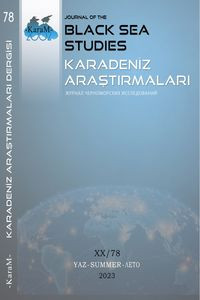ŞAHZADE BEHRAM VE MELİKE DİLRİZ ANLATISI ÖRNEKLEMİNDE UY-GUR SÖZLÜ KÜLTÜRÜNDE BİR ÂŞIK TİPİ OLARAK HIZIR
KHIDR AS A TYPE OF LOVER IN THE UYGUR ORAL CULTURE IN THE CASE OF THE NARRATIVE SHAHZADA BEHRAM AND MELIKE DILRIZ
Author(s): Esra ÇamSubject(s): Customs / Folklore, Cultural Anthropology / Ethnology, Sociology of Culture
Published by: Karadeniz Araştırmaları Merkezi
Keywords: Uyghur; oral culture; narrative; Khidr; type;
Summary/Abstract: Folk narratives are an important component of cultural memory. Narrative, which reflects information, experiences and teachings from the past, serves the function of ensuring the continuity of cultural memory, protecting the identity of the society and transferring it to future generations. Turkish folk narratives are mostly the product of the transition to settled life and are a genre that contains many codes about this period of the Turks. The theme of love come to the fore in folk narratives especially with the influence of the settled life. The Uyghurs are a deep-rooted Turkish tribe that has survived on the stage of history since the early periods and had an early settled life. It is possible to see their deep-rooted past in the oral and written tales they have created. The narrative of “Şehzade Behram and Melike Dilriz”, which is the subject of the current study, is an example of this. In the narrative, the features that the heroine looks for in a spouse and the competitions the she forces male heroes to take part in are among the motifs that carry the cultural codes of the settled life. The type of Khidr that takes shape in this context and occupies a central position in this study is a product of the collective memory of the Uyghur Turks, and it has both similar and different characteristics with the traditional Turkish belief in Khidr. In this article, the structure and characteristics of the type of Khidr in the belief system and culture of the Uyghur Turks were identified and examined.
Journal: Karadeniz Araştırmaları
- Issue Year: 2023
- Issue No: 78
- Page Range: 513-532
- Page Count: 20
- Language: Turkish

